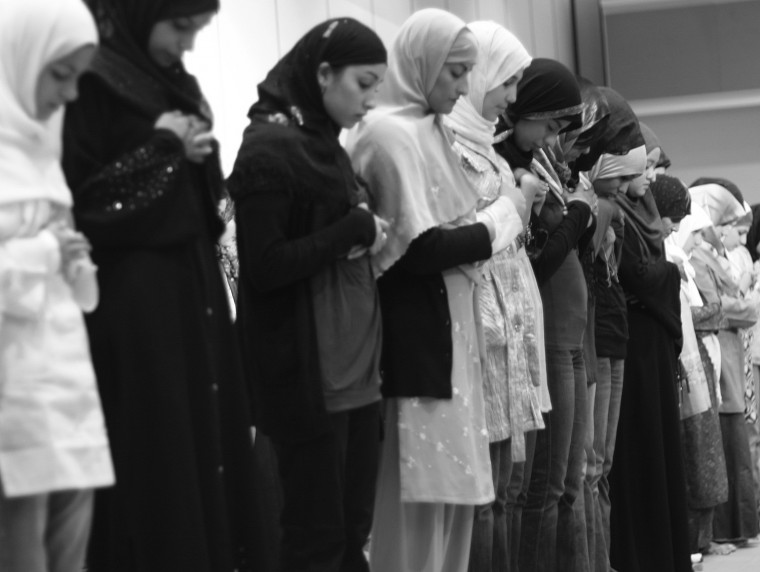‘Fast your soul’
October 24, 2007
Becky Sawyer, a junior government major, said she recently had a life-changing experience after visiting a local Muslim center. Sawyer and her high school friend are finally talking again, after a two-year period of no contact because of a feud.
Sawyer said it was her visit to the center during the Islamic month of Ramadan that helped her reflect on what needed to be changed in her life.
“To me when you have quarrels with people, sometimes it ends up giving you a bad, foggy perception of who the other person is,” she said. “After that experience I can tell you my view is completely clear.”
There were 200 other students who joined the Muslim Student Association’s 6th annual Fast for a Day event held on Oct. 8 in Sacramento State’s University Union III. Many students were able to feel the same weight being lifted off their shoulders as well as the challenges faced during Ramadan.
Saba Saghir, the MSA’s dawah, or invite to Islam, coordinator, said Ramadan is the ninth month of the Islamic lunar Calendar. It is the month in which Muslims fast everyday from sunrise to sunset. It’s not only fasting from food and drink, but also physical desires of lying, fighting, et cetera.
This implies that it is not only the fast of the stomach but also of the eyes, hands, and feet – the whole body, which are kept away from the prohibited. During Ramadan, Muslims tighten their bond as a community. Ramadan is also a month of remembrance of the Muslim god, Allah.
“Ramadan is trying to control our desires rather than letting our desires control us,” Saghir said.
Hadi Shirmo, a junior economics major, said he’s been practicing Ramadan the whole month and said there are many misconceptions because people think it’s just fasting from food.
“It’s like purifying your whole soul basically,” he said.
Shirmo said he has been fasting since he was 12 and the purpose of fasting is to feel a poor person’s pain so you appreciate what you have every day.
“It’s like, you’ll appreciate the hamburger your mom gives you everyday,” he said.
Sawyer said practicing Ramadan is easy because her church, The Church of Jesus Christ Latter-day Saints, fast once a month anyway.
“For me, it’s a piece of cake, no big deal,” she said.
She also said being a part of two organizations with different religious values don’t conflict because both are so welcoming and that in fact, her church members want the MSA president to speak at one of their services.
Majdi Abuhadien, a pre-law freshman, said fasting can be really challenging sometimes, especially if you play a sport.
Water is not even allowed during fasting, he said. But he said the reward of Ramadan and the feeling you get from it is even better.
“Anything you do in Ramadan is like 70 times better and sometimes it gets to 100 (percent) in certain things,” he said.
Abuhadien said he witnessed the advantages of fasting when he played soccer.
“It seems like I honestly played better during Ramadan,” he said. “I know it’s because God was on my side.”
Saghir said during Ramadan, it’s believed the devil is chained. Therefore, it has no effect on people’s thinking or actions and wrongdoing committed. During that time people react because of their own desires.
The students said there are definitely days when fasting is not so easy also.
Abuhadien said one of the hardest fasts for him is food.
“Everyone’s always eating in this country,” he said.
Shirmo said you have to get up before the sun rises to eat or drink lots of water. He said he even drinks at least a gallon of water before the sun rises, even if he doesn’t want it. He also said he catches himself walking toward a drinking fountain for water all the time.
“Thirst is what gets you,” he said.
Shirmo on the other hand, said the hardest thing about fasting is girls.
Most of his friends will go to parties, but Shirmo refrains from attending because he said he doesn’t even want to be in an environment where it might lead him to do something he’ll regret.
Saghir said that if a fast is broken, it’s considered a sin. There are three ways to compensate for breaking a fast. A person can feed 40 poor people, sacrifice or fast after Ramadan.
Abuhadien said Ramadan becomes a very personal relationship between you and God.
“I could cheat if I wanted to. No one tells me I can’t do nothing all day,” he said. “But it’s between God and me.”
There are also Muslims who don’t fast, including the elderly, children and the sick who are being medicated, Abuhadien said.
The last 10 days are the holiest of Ramadan, Saghir said.
There is one night in the last 10 days called The Night of Power. On that night, if you worship all night, it counts as if you had worshipped 1,000 months, she said.
The only problem is, nobody has an idea of when that night is except that it falls on an odd day in the last 10 days according to the prophet Muhammed, Saghir said. She said Muslims try to worship more these last days.
Ramadan ended last week, but Sawyer said her first experience with Ramadan has been great. She said what it does, is it brings you down to a level of humility and you start reflecting on why you’re doing something and it really makes it more of a purposeful thing.
Sawyer also said her friend and her are doing just fine.
“I guarantee you it’s all totally water under the bridge now,” Sawyer said. “In fact I spent the entire weekend with her.”
Gia Vang can be reached at [email protected]





























































































































